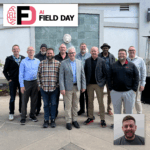|
|
This video is part of the appearance, “Articul8 Presents at AI Field Day 7“. It was recorded as part of AI Field Day 7 at 10:30-12:00 on October 30, 2025.
Watch on YouTube
Watch on Vimeo
At AI Field Day 7, Dr. Arun Subramaniyan, Founder and CEO of Articul8, presented a compelling vision of the future of enterprise generative AI (GenAI) centered on hyper-personalization and domain specificity. The talk addressed the evolution of AI accessibility, highlighting how general-purpose models have become commoditized, making it easier than ever to generate content but often sacrificing depth and context. Dr. Subramaniyan emphasized the limitations of relying purely on generic large language models (LLMs) for enterprise tasks, especially in specialized domains like healthcare, manufacturing, cybersecurity, and energy. Instead, Articul8 advocates for tailored solutions built using domain-specific models that can factor in both tacit knowledge and contextual nuances that general models may overlook or misinterpret.
Articul8’s technological strategy involves developing proprietary models specifically trained or fine-tuned with datasets relevant to particular industries. These models range in size from a few billion to several hundred billion parameters. They are not designed to be general-purpose but to perform specific tasks within domains such as thermodynamics, aerodynamics, and system diagnostics. Articul8 also builds task-specific models, such as those focused on table understanding in spreadsheets or parsing complex PDFs. These models are augmented with multi-model orchestration capabilities and metadata tagging to construct automated knowledge graphs, enabling richer semantic understanding without moving raw data—only metadata is transferred. This approach allows enterprises to retain control over data security, including air-gapped deployments, while benefiting from AI-powered insights.
Articul8’s platform architecture supports both on-premises and SaaS-based models, enabling flexibility in deployment. The platform can ingest unstructured data, apply semantic reasoning, and, using a combination of models and tools, generate agents and squads of agents that autonomously execute “missions” within enterprise workflows. This layered AI model architecture culminates in creating “digital twins,” which are dynamically updated representations of business systems for simulation and high-fidelity analysis. Demonstrating measurable performance gains, Articul8 benchmarked its energy domain model against state-of-the-art general-purpose models like LLaMA 3, GPT-4, and others, showing superior results across multiple task dimensions. The company maintains control of intellectual property in models unless customer data is involved in training, in which case the IP resides with the customer. This approach ensures scalability while maintaining rigorous standards for contextual accuracy, enterprise integration, and domain relevance.
Personnel: Arun Subramaniyan








